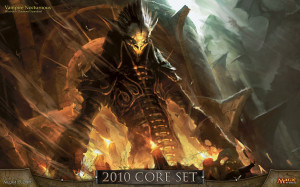Editor’s note: this article was written by Jason Hill.
The question that has plagued man since the dawn of time. Well, 1993, to be precise, when the game was invented. I know, some of you that think 1993 was the dawn of time. (kids these days) The sad truth of it all, is that Magic the Gathering is for nerds … and the occasional devil worshiper … but mostly for nerds. Real nerds, and everyone knows this. Even the old grandmas who only leave their rooms for bingo know this.
There seems to be this barrier present in all our lives. A barrier in which, once crossed, there’s no coming back. Everyone seems to be afraid to enter the labyrinth of mana and spells. It takes a special, select few, who are brave and adventurous enough to take on this card game. But how did we do it? How do we convince our friends, loved ones, and strangers who don’t immediately run away from us to do it as well? Strap in because we have a lot of work to do.
The real problem is that Magic the Gathering has been lumped together with LARPing and D&D. People, even those who consider themselves nerds, see us and say “Oh, no. What are they doing? Do they realize how idiotic and weird they look (and or sound)? I’ve got to steer clear of this mess!” Now, to be fair, when an outsider sees all the different cards; hears all the complex jargon; surveys all the dice counters, card sleeves, and deck boxes, it can be a little scary. So it’s our job to raise this game from where it lies! Elevate our peers’ understanding of our obsession! We must imbue our ways as good and right among the populace wherever we may stand! Now that you’re motivated, we’ll move on to the solution.
Fair warning: You cannot force someone to play Magic the Gathering. Okay, don’t twist my words. I’m aware that you could physically force someone to do something against their will, but if the movies are anything to go by, nine out of ten nuns frown upon that line of thinking. If a person does not want to play, they won’t. The trick is to get them to want to play.
I can almost hear you shouting at your screen, “I’ve already tried this, and it totally backfired!” First, shouting at your screen makes you look like a lunatic. Please stop. Second, no one says “Totally” anymore. Finally, you went about it the wrong way. Let me guess, you were really excited and were telling them all about the cool cards, mechanics, and what not. Blurting out all the cool keywords that came to mind. Then they looked at you like you were not of this world and tried to leave as quickly as possible. I’m pretty close, aren’t I? You can’t do that. It’s like trying to convince a timid person to enter a haunted house by telling them how scary and realistic the monsters are.
You have to use a little reverse psychology. Cool off. Don’t talk about it for a while. Only mention it casually. Like if they ask you where you’re going or what your plans are. Now, if you’re not a Blurty McBlurterpants and start off this way, then they will probably start asking you about it and maybe show some curiosity toward your hobby. This is where it gets difficult. The temptation will be to not only answer their questions but explain everything else the way only old Blurty knows how. Your goal is to answer as concisely as possible and ease any worries or fears with out more information than is necessary. The beauty of MTG is in the discovery. The more they learn on their own, the more likely they will want to be involved. It is good to be a source of information when they need it, but only when they need it.
Right, time to run the scenario where you scared them off. Follow the instructions in the above paragraph. Your path will diverge when you get a scoff instead of a question. This is going to take a bit more work. For the time being, leave that person alone and start working on someone you’re both acquainted with. The more amicable the relationship between the three of you, the better. Once that person starts playing, you have a chance again. The person who was scared off might be more willing to give it a try if he or she knows another friend is also into it. The more friends he or she has playing Magic, the more likely they will want to join in.
There will always be someone who will not play no matter what. Be it principal, religious reasoning, or just plain stubborness, they will abstain from the experience until the end of time. If this
is the case, do not continue to pester them about it. This will only strain the relationship. Conversely, do not abandon them for their refusal of a game that you love. For friendship is much more important than any game could ever be.
For the time being, let’s assume that you were successful in persuading a friend to join you for a game. What was that? No one has ever assumed that you would be successful before? Well, I ah … you see … I mean, I’m sure someone … It’s funny how words can be so illusive in an akward situation. Anyway, you got them around the table. What’s the next step?
Teaching Magic 101
Lesson 01: Let them play. Finally, after all the pleading, bribery, and agreeing to seven months of dish washing duty, you have your self a student. The last thing you want to do is bore them to death by going over the rules. Showing is easier than telling. Give a quick tutorial by drawing a hand, laying down land, explain that tapping the land lets you use spells, (show an example spell) and try to make the connection between tapping land for mana and the spell’s cost. That’s it. Shuffle and play. Explain everything else as it happens. (without a condescending tone) It’s a good idea to have a glossary handy. That way you don’t have to explain all the keywords yourself. (remember, discovery is vital)
Important: Watch the face of the student during the tutorial. If confusion runs across it at any time, stop the tutorial. Say, “You’ll understand it better when we’re playing.” and start the game. There might be some confusion at first, but it’s easier to retain information when you’re doing instead memorizing.
Also Important: Go first. It’s a lot easier to imitate someone’s actions than go it alone. It also gives them more confidence knowing how a turn works before hand.
Lesson 02: Use casual decks. You don’t want to lend them the perfectly crafted, super complicated tournament winner your so proud of. Your storm deck will be useless in the hands of someone who doesn’t understand the storm mechanic. Their best bet will be to get a pre-made starter deck, but there are those who would rather not spend any money on an experience they are unsure of. If this is the case, try to lend them a deck that has only one or two mechanics in it. (flying and unleash for example) Basically, remember that while your student may not be an idiot, they might get overwhelmed easily.
Lesson 03: You don’t want to win. You don’t want to lose. No, I’m not suggesting a Platinum Angel / Abyssal Persecutor combo. (look them up. I promise not to tell anyone you didn’t know what they were) I’m saying that you want to control the game, but not with a control deck. What you want to control is the tempo of the game. You don’t want to crush your student in their first game. They will more than likely walk away, never to return to MTG. You don’t want to let them win either. They might feel pitied or inept, which might also lead to them walking away.
What you want is for them to have an experience. A chance to do some cool things during the course of the match. Let them drop a 6/6 bomb and try to answer it with your creatures before you Doom Blade it out of existance. There needs to be a sense of accomplishment with almost every action they take. There needs to be no fear on their part on whether or not they should play a spell. You’re fighting an epic battle, where both sides are nearly equal and one side has to eek out a victory or die trying. This takes a very keen sense of awareness. Don’t try to anticipate their moves, but rather react to what they do in such a way that doesn’t completely all down any avenues of strategy.
Lesson 04: Grace goes a long way. Beginners are going to make mistakes. A lot of them. Way more than you remember making when you first started. Now you’ll have to step down off you high horse for a second, cause you’re not on the Pro Tour yet. (If you are on the Pro Tour and your reading this, could you sign my hat?) If they ask for a re-do or if they can take something back, go ahead and let them. On
the flip side, if they’re losing pretty bad, you might want to make some “mis-plays” to give them a slight edge. If they’re down to 5 life, maybe you might “forget” the trigger that makes them lose a life or discard a card. The game becomes a lot more interesting when you do, trust me. You will also find yourself explaining the same things multiple times. Have patience. Once they get the hang of it, it’ll be worth it.
Lesson 05: There is no Lesson 05. Don’t overthink this one. It’s supposed to be very zen like.
Lesson 06: The first game is one on one. One of the biggest mistakes you can make is to put your student into a group setting for their first game. There is one exception to this rule. If the group is focused on beginners, as in more than one beginner and more than one veteran, and the veterans are there only to help the beginners, then it’s okay. You may think, “But my Magic buddies are all really friendly and really helpful. My student will love them.” This might be true later on, but for the first couple of games, the student will be overwhelmed. Your friends will end up being too helpful, and with all those decks and mechanics working against eachother, it’s too much to information for a newbie to take in all at once.
Congratulations! You have just completed your first course in Teaching Magic. Unfortunately, these credits won’t transfer. However, you now have a 28% better chance of getting a friend, loved one, or complete stranger into a card game that you love. Best of luck.
Do you have any tips or tricks that I may have missed? Are there any aspects of Magic that you’d like me to write an article on? Please let me know in the comments below. Thanks.
Jason Hill has spent many years trying to earn a PhD in Magic the Gathering, and eagerly awaits it to be a real degree.



